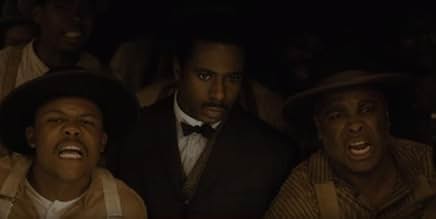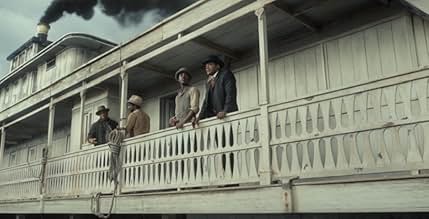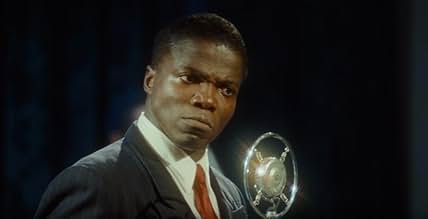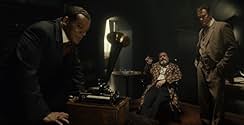Füge eine Handlung in deiner Sprache hinzuA mythical account of the life of Buddy Bolden, the first Cornet King of New Orleans.A mythical account of the life of Buddy Bolden, the first Cornet King of New Orleans.A mythical account of the life of Buddy Bolden, the first Cornet King of New Orleans.
- Auszeichnungen
- 2 Nominierungen insgesamt
Donald Elise Watkins
- Brock Mumford
- (as Donald Watkins)
Empfohlene Bewertungen
Many reviewers must have missed the part of Ken Burns Jazz that centers on most of the roots of the truly American form of music from the last century? Buddy Bolden was the style influencer for Louis "Pops" Armstrong, who grew up in an adopted setting in New Orleans.
Armstrong often heard Buddy Bolden playing on river boats from the river banks into the wee hours of the morning. His adoptive parents recognized the value of music and instrument training early on. When they took Armstrong to select an instrument to learn, they hinted around about a woodwind or string instrument, but Armstrong was already hooked on the Coronet from listening to Bolden and others in the City.
What may be very distracting to some of the viewers is the fact that Bolden was a schizophrenic with hallucinations and deep depression, For this, he was eventually institutionalized. The story is managed as Bolden sees it, eventually from his cell at the asylum that he was interned into. This is not any harder than following about any Quentin Tarantino movie or others which find a way of describing current and past sections of time into 90 or so minutes of film.
This film has the burden of also showing how even the most talented people of color were often taken advantage of by crooked, managers, record companies, theatre owners and other grifters and swindlers in the entertainment industry of the time. I believe they do an exceptional job of placing Bolden within the reach of several unsavory characters beset on separating him from his music and talent in order to pad their own pockets.
Wynton Marsalis wrote and orchestrated the music for this film and likely is the only living human being capable of doing so with the true essence of the time, characters and musical theme of the times. From "Jazz", by Burns et.al., Marsalis explains the voices of the New Orleans sound and the POP of the Bolden style that he was ultimately famous for both as unique and as a major influence to Armstrong, one of Marsalis's iconic performance player. In "Jazz", Marsalis narrative and emotion in discussing these two, Bolden and Armstrong, reveals his feelings for them and their places as Jazz icons of the first degree.
If only they had a scene with Sidney Bechet (1897-1959), the New Orleans sax player that would have been about Bolden's age. Mr. Bechet was a brawler. If he didn't get paid right for a gig, he would take his fee out in damages upon the locale he was playing in. He was also a victim of unscrupulous dealings with the white ownership structure in New Orleans. Early in life, he left the US for Europe where he and many other Jazz musicians of the time went to play to full houses of appreciative, jazz starved fans. Remember, those fans did not yet have records. Live performances were the rage of the time.
What may be very distracting to some of the viewers is the fact that Bolden was a schizophrenic with hallucinations and deep depression, For this, he was eventually institutionalized. The story is managed as Bolden sees it, eventually from his cell at the asylum that he was interned into. This is not any harder than following about any Quentin Tarantino movie or others which find a way of describing current and past sections of time into 90 or so minutes of film.
This film has the burden of also showing how even the most talented people of color were often taken advantage of by crooked, managers, record companies, theatre owners and other grifters and swindlers in the entertainment industry of the time. I believe they do an exceptional job of placing Bolden within the reach of several unsavory characters beset on separating him from his music and talent in order to pad their own pockets.
Wynton Marsalis wrote and orchestrated the music for this film and likely is the only living human being capable of doing so with the true essence of the time, characters and musical theme of the times. From "Jazz", by Burns et.al., Marsalis explains the voices of the New Orleans sound and the POP of the Bolden style that he was ultimately famous for both as unique and as a major influence to Armstrong, one of Marsalis's iconic performance player. In "Jazz", Marsalis narrative and emotion in discussing these two, Bolden and Armstrong, reveals his feelings for them and their places as Jazz icons of the first degree.
If only they had a scene with Sidney Bechet (1897-1959), the New Orleans sax player that would have been about Bolden's age. Mr. Bechet was a brawler. If he didn't get paid right for a gig, he would take his fee out in damages upon the locale he was playing in. He was also a victim of unscrupulous dealings with the white ownership structure in New Orleans. Early in life, he left the US for Europe where he and many other Jazz musicians of the time went to play to full houses of appreciative, jazz starved fans. Remember, those fans did not yet have records. Live performances were the rage of the time.
I knew nothing about Buddy Bolden before seeing this film and after seeing it I know even less. This film is put together like a two hour trailer, the scenes jump around in time and never seem to build to a satisfying emotional conclusion. There are individual shots that promise something interesting, but never seem to finish. Even the jazz numbers which are well arranged by Wynton Marsalis, do not get to finish. And most music varies in fidelity and we move thru time and space.
The period details are perfect as is the music, sounding like it's played on period instruments. The performances are believable especially Gary Carr as Buddy Bolden who presents a broad range of emotions. He can be exhibiting a youthful energy exploring the nascent possibilities of jazz, or suffering trough rough parts of his life. The most familiar face in the cast is Ian McShane, but his charter is presented in such a choppy way, I have no idea who his character was or how he figured in Bolden's life.
I saw this at a special screening with the writer director Dan Pritzker in attendance, and he acknowledged that no recording of Bolden exists and so little is known about Bolden that he has no idea if he invented jazz or not, he just thought it was a good tag line.
The period details are perfect as is the music, sounding like it's played on period instruments. The performances are believable especially Gary Carr as Buddy Bolden who presents a broad range of emotions. He can be exhibiting a youthful energy exploring the nascent possibilities of jazz, or suffering trough rough parts of his life. The most familiar face in the cast is Ian McShane, but his charter is presented in such a choppy way, I have no idea who his character was or how he figured in Bolden's life.
I saw this at a special screening with the writer director Dan Pritzker in attendance, and he acknowledged that no recording of Bolden exists and so little is known about Bolden that he has no idea if he invented jazz or not, he just thought it was a good tag line.
Taken from the perspective of Bolden's asylum residency and the reflections of his life, success, frustration and failure, I found the movie at times restless, but overall very interesting. The period sets, costuming, and social tension make the movie work, as the shards of his life and his ambition dovetail into his ultimate failure and loss. In reality, little is known of his music or the facts of his life, but his influence was profound and shaped jazz (jass) music. To do Bolden justice I would be happy to see a proper documentary, but if this movie keeps his accomplishments in our culture's mind then it was a good endeavor. Now go read his Wikipedia page, and listen to some early King Oliver or Louis Armstrong records!
This is not a Buddy Bolden biography because too little is known about him. This film tells of the legend of Bolden and is filmed like one big nightmare/beautiful dream, sequence. Even though I'm not a big jazz fan, the music was fabulous and I couldn't get enough. Excellent acting on the part of Gary Carr in particular, and the entire cast in general. It also makes you wonder about all the important events, good or bad, that went unrecorded in history. This movie is well worth your time as long as you know what to expect.
The story could have been told more clearly. I understand that they were trying to mirror the flashbacks of an insane genius, but it would have worked just fine if the story had a little more order and clarity. I honestly figured from the trailer that the storytelling might have been off, but I was so drawn in by the music and the overall look of the movie that I still just had to see it. Despite some major drawbacks in plot, I do not regret watching it at all. The music! That's what I came for. The actor playing Bolden wasn't half bad to look at either. The actor playing his manager (who also had a significant role on Boardwalk Empire) has a look that seems to fit that time period so well. He is fun to watch on screen. Not much to the plot, but the look and sound (the sound!!!) of this film definitely worth the watch. If you like jazz or if you don't, watch it for the music. Now that I've finished I can do some of my own research into Buddy Bolden who seems like a fascinating enigma.
WUSSTEST DU SCHON:
- WissenswertesBolden's cornet solos were performed by multiple Grammy winner, Wynton Marsalis.
Top-Auswahl
Melde dich zum Bewerten an und greife auf die Watchlist für personalisierte Empfehlungen zu.
- How long is Bolden?Powered by Alexa
Details
- Laufzeit1 Stunde 48 Minuten
- Farbe
- Seitenverhältnis
- 1.85 : 1
Zu dieser Seite beitragen
Bearbeitung vorschlagen oder fehlenden Inhalt hinzufügen





































